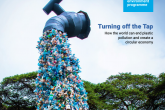Compostable Coalition UK releases successful compostable packaging consumer trial
The Compostable Coalition UK, and its advisory board members M&S, Ocado and WWF, has released results from a consumer trial that reports a five-fold increase in consumers disposing of compostable packaging in their food waste bins.
 The six-week trial involving 120 households in Medway encouraged residents to dispose of compostable packaging in their food and garden waste bins. The advice around disposal of compostable packaging varies between local authorities, resulting in consumer confusion.
The six-week trial involving 120 households in Medway encouraged residents to dispose of compostable packaging in their food and garden waste bins. The advice around disposal of compostable packaging varies between local authorities, resulting in consumer confusion.
The trial concluded that clear communication and labelling led to correct disposal, with contamination also dropping throughout the trial period.
By the end of the trial, food waste volumes increased 23 per cent and contamination levels dropped from an average of nine per cent to three per cent.
The compostable packaging trial
The trial involved households being sent boxes containing groceries wrapped in both compostable and plastic packaging. The groceries included items such as confectionery, snack food, fresh produce, tea bags, coffee pods, and came from a variety of retailers and brands.
The items in compostable packaging were marked with new labels developed by Hubbub and OPRL, with participating households were also sent educational resources that encouraged them to check packaging labels, use the food waste bin for disposal of compostable packaging, and explained the composting process.
Alice Harlock, Director of Technical and Member Services OPRL said: “In our survey, the majority – 54 per cent – reported that the greatest barrier to recycling was confusion over whether items were recyclable. So we can be confident that tackling confusion with clear labels and instructions will help to drive greater volumes of material for recycling.”
Industrial composting
Alongside the consumer trial, Compostable Coalition UK also carried out a trial at EnVar – one of the largest composting sites in the UK – to test for effectiveness of compostable packaging to biodegrade under normal operating conditions of an industrial composting site.
Results from this trial showed that the packaging biodegraded successfully, with the resultant compost passing PAS100 certification – the standard for compost in the UK.
Compostable packaging is designed to be collected and treated along with food and other bio-waste in industrial composters, but many local authorities do not encourage the reclamation of compostable packaging due to concerns around contamination.
The Compostable Coalition has been gather new data on compostable packaging to address Defra’s call under the Simpler Recycling Reform for more evidence on compostables to “inform future guidelines”.
Comment
Julia Schifter, VP Strategy Analysis, TIPA & Co-Founder, Compostable Coalition UK said: “Compostable Packaging offers a new way to achieve circularity for some of the most challenging hard-to-recycle’ plastics. Yet, the proper collection and treatment of compostables is key to achieve a full circularity for these products. The results of our study clearly prove that once consumers are provided with a label that positively instructs them where to discard such packages, their ability to behave accordingly increased dramatically.
Jen Vanderhoven from the BBIA said: "What this trial shows is that by clear consumer labelling and communications, compostable materials can be easily recognised by consumers and therefore effectively collected with food waste in households. We are hopeful that Defra will recognise the results of the successful trial and allow compostable packaging to be disposed of with food waste, for treatment by anaerobic digestion and in vessel composting. The impact of this could be huge, potentially saving millions of tonnes of food waste from going to landfill, and therefore significantly reducing GHG emissions - it's a win-win for both consumers and the environment"
Alice Harlock from OPRL concluded: “This trial reinforces the message that providing consumers with clear, visible labels can have a positive impact on both participation and contamination. The findings of the pilot back up OPRL’s own consumer research, which shows that consumers look for information on recycling at the point of disposal.








